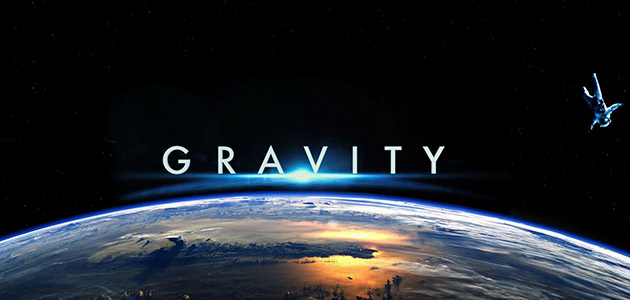14 November 2013
The Gravity of Gravity
by Dr Mark McConnell
You’ve probably heard by now, Gravity is unlike any other movie in terms of the experience it gives and leaves you with. It’s realistic, breathtaking, terrifying, beautiful, artistic, deeply spiritual and definitely intense – all at the same time. In its 3D format, which is arguably the only way to see it, it will be the closest most of us will get to going into space. Throughout most of the movie I sat clinging to my seat. At the end I felt exhausted. My wife and I sat through the end credits trying to come down from our alerted state. On discussion boards I’ve read of a number of people whose bodies felt sore at the end.
Despite the impression you might get from the publicity, Sandra Bullock plays the main character Dr Ryan Stone. She is a scientist with little experience of space – causing her to be both nervous and nauseous. In contrast to George Clooney, who plays laid back veteran astronaut Matt Kowalski, this is definitely not her natural habitat. In Sandra Bullock’s character we see ourselves: a fairly ordinary human being facing the supreme challenge of life or death.
The story is fairly straightforward. Dr. Stone is part of a group of astronauts on a routine mission working on the Hubble Space Telescope. They end up stranded in orbit because of a missile strike on an obsolete satellite that has caused a chain reaction of destruction. They must fight for their survival. After the first wave debris hits, only Stone and Kowalski are left alive.
As this happens it feels as if we are right there with Dr Stone. The point of view moves masterfully from the objective to subjective experience – from third person to first person; from looking on as observers to being in Dr Stone’s spacesuit so that her breathing becomes our breathing and her panic becomes our panic. Space is not a friendly place. Without gravity it is inhospitable. All previous orientation is gone. There is no anchor to ground us. We are pulled into the experience in which we are not in control. We face the possibility that we might float off and die, in our helpless state, completely and utterly alone. We feel the ultimate limitation of our humanity despite all our technological advancement.
(Spoiler alert: I won’t give away the ending, but if you really want to know nothing about the movie, see it first.)

But gravity is not only an issue in the unlimited expanse of space; perhaps even more significantly, it is also an issue in the interior of who we are. The root word of “gravity” is “grave,” which can be used either as an adjective, meaning weighty or severe, or as noun, referring to the location we end up in after death. The film pivots on the moment that Stone decides that her unbearable misfortune means there is no longer any point in hoping. She switches off her oxygen and prepares to die.
We find that this desperate action is in keeping with her life up to this point. She is not only alone in space; she is also alone in life due to the grief over losing her daughter. She is lost in her own sorrow and isolation. Her work is now the only thing that gives her purpose or meaning. With nothing compelling enough in her world she has no gravity to hold her and no anchor to keep her holding on to the bitter end. She has only been existing rather than living. And her daughter lies waiting for her on the other side of death.
As she slowly gives herself over to death, she offers up her first prayer to an anonymous non-English speaker through her radio. “No one will mourn for me. No one will pray for my soul. Will you mourn for me? Will you pray for me? I mean I’d pray for myself, but I’ve never prayed – nobody ever taught me how.” At this point Kowalski comes back on the scene. “You’re going to have to learn to let go,” he tells her. She has to let go of her grief and her sense of simply existing in order to truly grab onto life with both hands and so make the most of every moment. Likewise, we cannot live being defined by our losses.
In this place of gravity, where there is no gravity, we come face to face with the mystery of our own existence and our yearning of life. It’s a mystery as great as any in astronomy or physics – one we all have to grapple with.
Mark also blogs at www.fourthopinion.net
